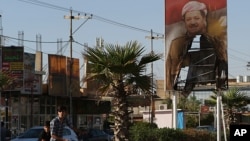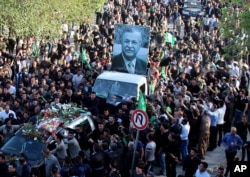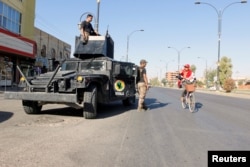Iraqi Kurdistan’s two main political families and their supporters traded accusations of blame Wednesday for the Iraqi army’s easy takeover this week of the city of Kirkuk and other disputed areas in northern Iraq, which the Kurds seized from the Islamic State terror group three years ago.
Some Kurdish leaders expressed fears that Kurdistan could split into two, if recriminations worsen, taking the region back to when it was divided during a three-year-long civil war between Iraqi Kurds in the 1990s that left more than 10,000 dead.
A senior official of the Patriotic Union of Kurdistan (PUK), the minority partner in the Kurdish government, warned of the risk of Kurdish infighting and reigniting of an old feud between the storied Talabani and Barzani families.
Mala Bakhtiyar, head of the PUK’s politburo, warned in a statement of the high risk of a civil war breaking out, which would invite regional and international interference, as it did in the 1990s with rival sides seeking the support of then Iraqi dictator Saddam Hussein and Iran.
Family members of the late former Iraqi President Jalal Talabani, who dominate the leftist PUK, are being accused of having cooperated with the Iraqi army and Shi’ite militias by ordering Peshmerga units they command to withdraw Monday from defensive lines protecting Kirkuk.
Jalal Talabani, who was nicknamed Mam (uncle) and was Iraq’s first non-Arab president, died on October 3 after complications from a stroke.
The Talabani family was critical of the decision by Kurdistan’s president, Masoud Barzani, to hold an independence referendum last month, which triggered Baghdad sending in Iraqi forces this week to grab Kirkuk. Since the holding of the September 25 referendum, they have been urging Barzani and his Kurdistan Democratic Party to reach an accommodation with Baghdad short of separation.
And they refused to join a new “political leadership” body set up by Barzani to prepare for independence following September’s vote to secede.
The Talabani family denies they entered into any secret pact with Baghdad to ease the way into Kirkuk for Iraqi forces. There were less than two dozen casualties in isolated skirmishes, say local officials.
But the recriminations are becoming more heated and without the presence of Jalal Talabani, a conciliator at heart, they risk worsening, fear analysts. A furor erupted Wednesday among Barzani supporters when one member of the Talabani family said on television that he believes the Iraqi army has every right to be in Kirkuk, an ethnically-divided city that Kurds, Arabs, Turkmen and Assyrians have all claimed as belonging to them over the centuries.
Bakhtiyar said the PUK is also on the brink of a “big split” with some factions in the party angry with the high-handedness of the Talabani family. He called on the Kurdistan parliament to open an investigation into what exactly happened in Kirkuk and other areas abandoned to the Iraqi forces, a call that has been taken up more widely by KDP members.
On Twitter, a hashtag #Talabantraitors has been trending in Kurdistan. Young Kurds who are protesting the Iraqi seizure chanted anti-Talabani slogans overnight Wednesday.
In the wake of the protests, Iraqi Prime Minister Haider Al-Abadi ordered Shi’ite militias to withdraw from Kirkuk and only Iraqi army units to remain in the city.
President Barzani has been keeping clear of trading recriminations and has urged Kurdish unity. But in a statement he has said the fall of Kirkuk was due to “unilateral decisions of some persons within a certain internal political party of Kurdistan, which eventually led to the withdrawal of the Peshmerga forces.”
He avoided directly naming the PUK or the Talabani family, who during the 1990s turned to Tehran for support in the civil war while the KDP secured the help of Saddam Hussein. Kurdistan was reunited after the U.S.-led invasion of Iraq in a deal engineered by Washington, but the Peshmerga and security services were not integrated.
Iraqi Kurdistan’s oil minister pleaded at an international conference Thursday for international support and for oil companies not to forget the region. As well as occupying Kirkuk, federal Iraqi forces seized several oilfields in disputed territory from the Kurdistan Regional Government, which helped fund its budget.
Ashti Hawrami said at an oil conference in Italy that it was paramount for energy companies to continue to develop facilities in Kurdistan, which exported more than 550,000 barrels a day last month.
He was speaking a day after Rosneft, Russia’s state-controlled oil company, announced it had signed production sharing arrangements with the Kurdistan Regional Government to develop five fields in the autonomous state.













